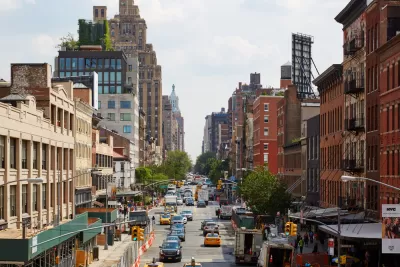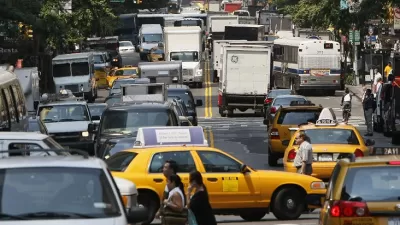An idea approved in 2019 which spent the last two years stuck in Trump and Covid limbo, will only now begin a slow march toward final approval.

"The MTA confirmed on Friday that it will take 16 more months to complete the required environmental assessment for congestion pricing," reports Dave Colon.
The idea of congestion pricing for a large section of Manhattan (a system also known as cordon pricing) has been floating on the fickle winds of political fortune for well over a decade. In 2008, the New York State Assembly killed a plan by then-New York Mayor Michael Bloomberg to implement cordon pricing in Manhattan with the help of federal funding made available during the Bush administration—money that eventually went to Los Angeles to fund the first toll lanes in Los Angeles County on several major freeways.
Congestion pricing in New York City seemed revenant in March 2019, when a rare alignment between then-Governor Andrew Cuomo, Mayor Bill de Blasio, and the New York State legislature broke the political logjam for congestion pricing, eventually winning a green light in April of the same year.
But by February 2020, the story had shifted to the obstacles presented by the Trump administration, before Covid added a new, larger obstacle to the ongoing delays caused by the Trump administration.
So what explains this latest setback? An agreement between the transit agency and the federal government, the MTA, the New York State DOT, and the New York City DOT has laid out a 16-month public outreach process: "a timeline that includes months of public meetings and briefings to determine if reducing driving into the central business district of Manhattan will be good for the environment and for long-suffering communities of color that have borne the brunt of decades of damage from the automobile."
As noted by Colon, the MTA officials had previously stated that the Environmental Assessment for congestion pricing in Manhattan would take only a few months. Mayor Bill de Blasio has since blasted the 16-month timeline as "ridiculous."
FULL STORY: MTA, Feds Promise Congestion Pricing Won’t Start For A Long, Long Time

Alabama: Trump Terminates Settlements for Black Communities Harmed By Raw Sewage
Trump deemed the landmark civil rights agreement “illegal DEI and environmental justice policy.”

Planetizen Federal Action Tracker
A weekly monitor of how Trump’s orders and actions are impacting planners and planning in America.

How Atlanta Built 7,000 Housing Units in 3 Years
The city’s comprehensive, neighborhood-focused housing strategy focuses on identifying properties and land that can be repurposed for housing and encouraging development in underserved neighborhoods.

In Both Crashes and Crime, Public Transportation is Far Safer than Driving
Contrary to popular assumptions, public transportation has far lower crash and crime rates than automobile travel. For safer communities, improve and encourage transit travel.

Report: Zoning Reforms Should Complement Nashville’s Ambitious Transit Plan
Without reform, restrictive zoning codes will limit the impact of the city’s planned transit expansion and could exclude some of the residents who depend on transit the most.

Judge Orders Release of Frozen IRA, IIJA Funding
The decision is a victory for environmental groups who charged that freezing funds for critical infrastructure and disaster response programs caused “real and irreparable harm” to communities.
Urban Design for Planners 1: Software Tools
This six-course series explores essential urban design concepts using open source software and equips planners with the tools they need to participate fully in the urban design process.
Planning for Universal Design
Learn the tools for implementing Universal Design in planning regulations.
Caltrans
Smith Gee Studio
Institute for Housing and Urban Development Studies (IHS)
City of Grandview
Harvard GSD Executive Education
Toledo-Lucas County Plan Commissions
Salt Lake City
NYU Wagner Graduate School of Public Service





























